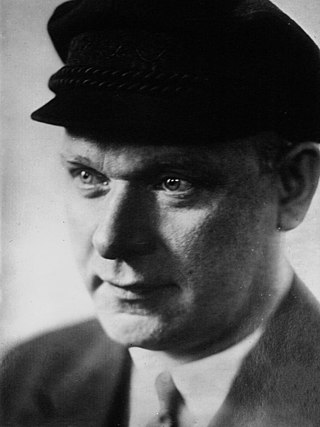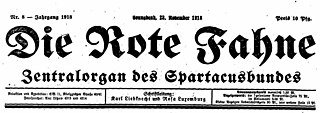Related Research Articles

Ernst Johannes Fritz Thälmann was a German communist politician and leader of the Communist Party of Germany (KPD) from 1925 to 1933.

Johannes Bobrowski was a German lyric poet, narrative writer, adaptor and essayist.

Ernst Wiechert was a German teacher, poet and writer.

Die Rote Fahne was a German newspaper originally founded in 1876 by Socialist Worker's Party leader Wilhelm Hasselmann, and which has been since published on and off, at times underground, by German Socialists and Communists. Karl Liebknecht and Rosa Luxemburg famously published it in 1918 as organ of the Spartacus League.

The Roter Frontkämpferbund, usually called the Rotfrontkämpferbund (RFB), was a far-left paramilitary organization affiliated with the Communist Party of Germany (KPD) during the Weimar Republic. A legally registered association, The RFB was banned in 1929 after violent clashes during May Day demonstrations in Berlin, but continued its work illegally.

Hubert Fichte was a German novelist.

Eva Strittmatter was a German writer of poetry, prose, and children's literature.

Günter de Bruyn was a German author.

Heinrich Fink was a German theologian, university professor and politician. In 1991 Fink was dismissed from Humboldt University of Berlin due to allegations against him being a former informer for the East German state security office, the Stasi. Fink denied the allegations.

Luise Rinser was a German writer, best known for her novels and short stories.

Ingeborg Drewitz was a German writer and academic.

Horst Möller is a German contemporary historian. He is Professor of Modern History at the Ludwig Maximilian University of Munich (LMU) and, from 1992 to 2011, Director of the Institut für Zeitgeschichte.
Reinhold Bernt was a German film actor.
Wolfram Adolphi is a German journalist and political scientist. From 1990 until the 1991 revelation that he had been an informant for the Stasi, he was head of the Berlin chapter of the Party of Democratic Socialism (PDS), which was a forerunner to the current Left Party.

Johann Burianek was a former Wehrmacht soldier and CIA-backed insurgent who planned and committed several attacks against the German Democratic Republic and a member of the anti-communist KGU.
Simone Barck was a German contemporary historian and literary scholar. A principal focus of her research was on Literature and the Publishing Sector in the German Democratic Republic.
Willy Sachse was a German socialist and communist who took part in the Sailors' Revolt at the end of the First World War. He remained politically involved during the 1920s and later became a writer. Drawn back into political activism during the early 1940s, he died by execution at the Brandenburg Prison.

Salomo Friedlaender was a German-Jewish philosopher, poet, satirist and author of grotesque and fantastic literature. He published his literary work under the pseudonym Mynona, which is the German word for "anonymous" spelled backward. He is known for his philosophical ideas on dualism drawing on Immanuel Kant, and his avant garde poetry and fiction. Almost none of his work has been translated into English.
Stefan Amzoll was a German musicologist, journalist and independent author. In 1989/1990 he was editor-in-chief of Radio DDR 2 and 1990/91 deputy editor-in-chief of Deutschlandsender Culture. A main focus of his work was New Music.
Sigrid Neef is a German musicologist and theatre scholar, focused on Russian and Soviet opera. She has been a dramaturge of the director Ruth Berghaus at the Deutsche Staatsoper Berlin for decades.
References
- 1 2 "Internationale Ernst-Wiechert-Gesellschaft" (in German). Ernst-Wiechert. Retrieved 26 October 2015.
- ↑ Krenzlin, Leonore (April 1999). "Roter Matrose und Widerstandskämpfer, der unbekannte Schriftsteller Willy Sachse" (PDF). Utopie kreativ (in German). H (102). Berlin: Rosa Luxembourg Foundation: 47–56. Retrieved 26 October 2015.
- 1 2 "Person: Krenzlin, Leonore" (in German). Katalog der Deutschen Nationalbibliothek. Retrieved 26 October 2015.
- ↑ ""Innere Emigration" Konnten und durften Künstler, Schriftsteller und Gelehrte in der NS-Zeit in Deutschland bleiben?" (in German). Berlin: Rosa-Luxemburg-Stiftung. 14 November 2013. Retrieved 26 October 2015.